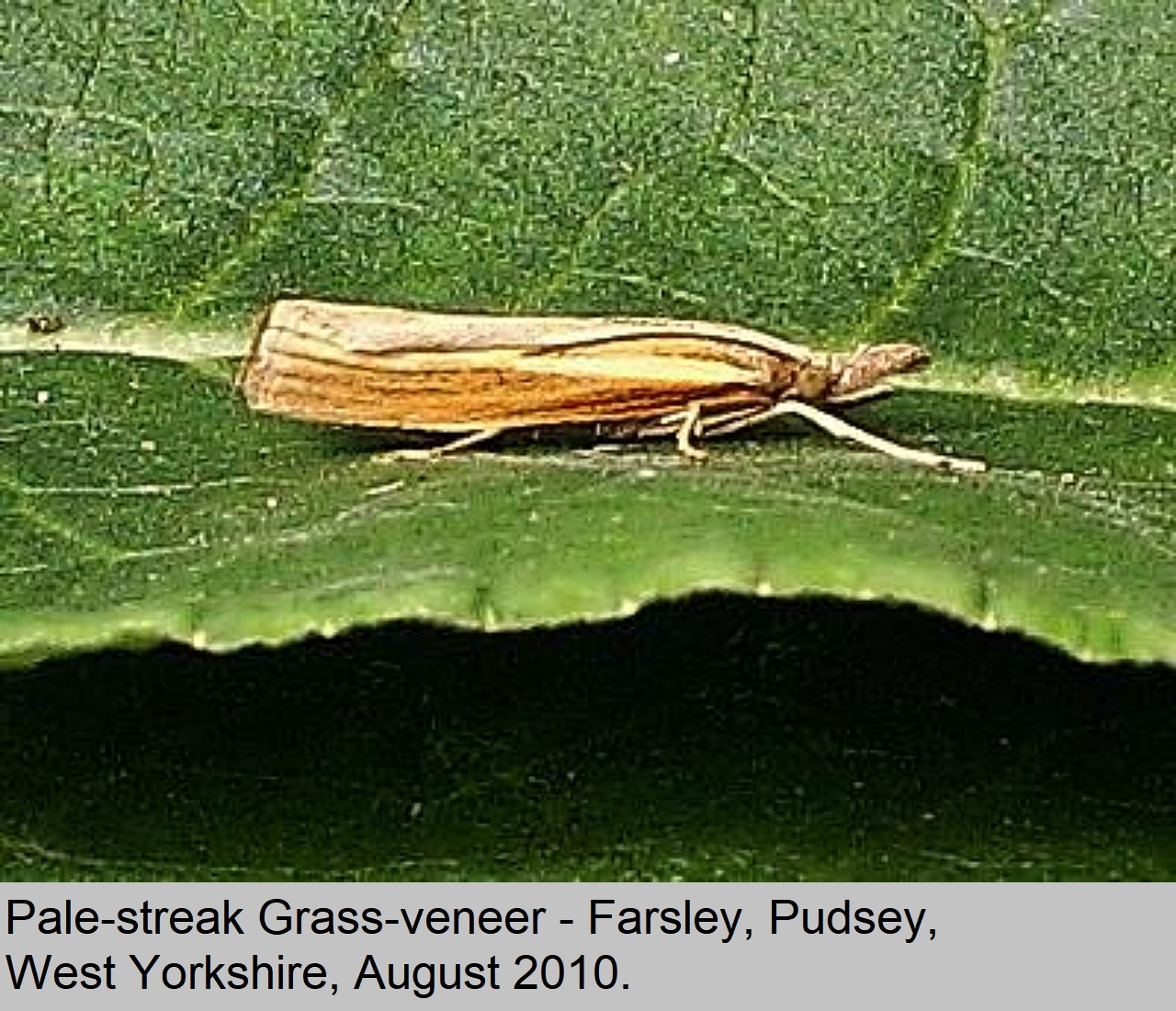|
|
||||||
|
|
|
|||||
| (Linnaeus 1758) | (Linnaeus 1758) | (Scopoli 1763 ) | (Scopoli 1763 ) | (Denis & Schiffermuller 1775) |
| Crambidae - Crambinae | Crambidae - Crambinae | Crambidae - Crambinae | Crambidae - Crambinae | Crambidae - Crambinae |
| Garden Grass-veneer | Garden Grass-veneer | Satin Grass-veneer | Satin Grass-veneer | Straw Grass-veneer |
| Chrysoteuchia culmella | Chrysoteuchia culmella | Crambus perlella | Crambus perlella | Agriphila straminella |
| 63.080 BF 1293 | 63.080 BF 1293 | 63.088 BF 1302 | 63.088 BF 1302 | 63.093 BF 1304 |
 |
Status: Resident in UK Wing Span: 18mm to 21mm. Flight Period: June and July. Habitat: Habitats are almost any open grassy places, the larvae feed on many grass species. Comment: This species is a wide spread resident throughout the British Isles, and is common on the mainland. |
 |
Status: Resident in UK Wing Span: 21mm to 28mm. Flight Period: July and August. Habitat: Grassland, such as parts of moors, commons, heaths and rough meadows. Comment: This species is common, and is resident throughout most of the British Isles. |
 |
| (Denis & Schiffermuller 1775) | (Denis & Schiffermuller 1775) | (Denis & Schiffermuller 1775) | (Denis & Schiffermuller 1775) | (Denis & Schiffermuller 1775) |
| Crambidae - Crambinae | Crambidae - Crambinae | Crambidae - Crambinae | Crambidae - Crambinae | Crambidae - Crambinae |
| Common Grass-veneer | Common Grass-veneer | Common Grass-veneer | Common Grass-veneer | Straw Grass-veneer |
| Agriphila tristella | Agriphila tristella | Agriphila tristella | Agriphila tristella | Agriphila straminella |
| 63.089 BF 1305 | 63.089 BF 1305 | 63.089 BF 1305 | 63.089 BF 1305 | 63.093 BF 1304 |
 |
 |
 |
Status: Resident in UK Wing Span: 25mm to 29mm. Flight Period: July to September. Habitat: Habitats are almost any open grassy places. Comment: This species is a common and widely distributed resident throughout the British Isles, with exception of Shetland. |
Status: Resident in UK Wing Span: 16mm to 19mm. Flight Period: July and August. Habitat: Habitats are almost any open grassy places. Comment: This species is a fairly common resident species occurring through out the British Isles. |
| (Denis & Schiffermuller 1775) | (Denis & Schiffermuller 1775) | (Hubner 1813) | (Hubner 1813) | (Hubner 1813) |
| Crambidae - Crambinae | Crambidae - Crambinae | Crambidae - Crambinae | Crambidae - Crambinae | Crambidae - Crambinae |
| Barred Grass-veneer | Barred Grass-veneer | Pale-streak Grass-veneer | Pale-streak Grass-veneer | Pale-streak Grass-veneer |
| Agriphila inquintella | Agriphila inquintella | Agriphila selsella | Agriphila selsella | Agriphila selsella |
| 63.090 BF 1306 | 63.090 BF 1306 | 63.092 BF 1303 | 63.092 BF 1303 | 63.092 BF 1303 |
 |
Status: Resident in UK Wing Span: 22mm to 28mm. Flight Period: July through until September Habitat: Grassland, preferably on the drier ones on light sandy soils. Comment: This species is widespread throughout the UK. It is common in the south, and is scarcer further north. |
 |
 |
Status: Resident in UK Wing Span: 25mm to 27mm. Flight Period: July and August. Habitat: Open grassy places. Comment: This species is a localised occurring in coastal, and some inland places. It is well distributed through out England, Wales, Ireland, south Scotland. |
| (Linnaeus 1758) | (Linnaeus 1758) | (Linnaeus 1758) | (Linnaeus 1758) | |
| Crambidae - Acentropinae | Crambidae - Acentropinae | Crambidae - Acentropinae | Crambidae - Acentropinae |
|
| Brown China-mark | Brown China-mark | Ringed China-mark | Ringed China-mark |
|
| Elophila nymphaeta | Elophila nymphaeta | Paraponyx stratiotata | Paraponyx stratiotata | |
| 63.114 BF 1345 | 63.114 BF 1345 | 63.117 BF 1348 | 63.117 BF 1348 | |
 |
Status: Resident in UK Wing Span: 22mm to 30mm. Flight Period: June into August. Habitat: Habitats are marshy area's, pond edges, slow flowing rivers, dykes and other wet land places. Comment: This moth is a fairly common resident in suitable localities, through out most of the British Isles. |
 |
Status: Resident in UK Wing Span: 15mm to 28mm. Flight Period: May and June. Habitat: Habitats are canals, pools, ponds and wet habitats where the food plants occur. Comment: This moth is widespread, but quite localised in the southern half of Britain. |
Species 3.001to 54.010 continued on the next page |
|
Contact Website Manager dave.hatton29@btinternet.com |
Web Designer Dave Hatton |
Dave Hatton reserves the copyright on all images. © 2022 |
||||||